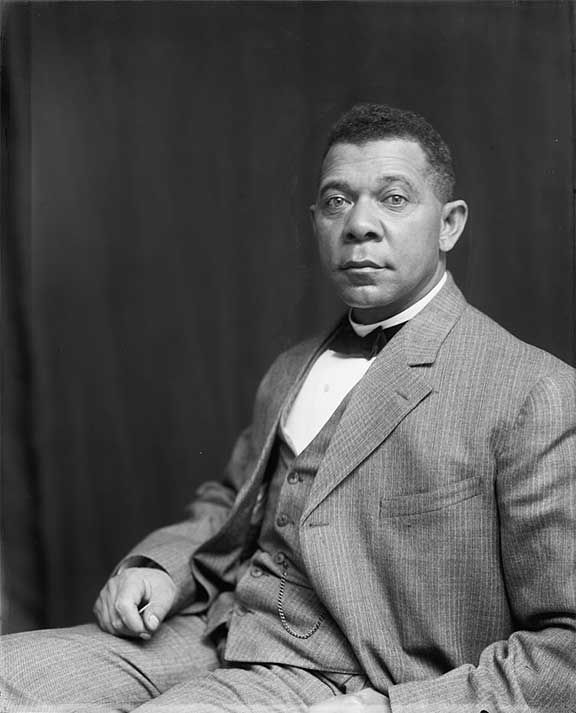Booker T. Washington Publishes "Up From Slavery"

In 1901 Booker T. Washington published his autobiography "Up From Slavery." The next year, Washington dined with President Theodore Roosevelt at the White House. Washington was the principal of Tuskegee Institute, a major training center for Southern Blacks. Washington was a major proponent of the belief that Blacks should not agitate for political power, but should instead concentrate on education.
Booker T. Washington was born into slavery in 1856. Although just a young boy he experienced the harsh realities of slavery firsthand. After the Civil War, Washington worked in various manual labor jobs to support his family while pursuing an education. His dedication led him to the Hampton Normal and Agricultural Institute in Virginia, where he thrived under the guidance of General Samuel C. Armstrong, who would become his mentor.
In 1881, Washington was appointed as the principal of the newly established Tuskegee Normal and Industrial Institute in Alabama. Under his leadership, Tuskegee became a leading institution for the vocational training of African Americans. Washington emphasized practical skills and self-reliance, believing that economic independence was crucial for the advancement of Black people in America. He advocated for industrial education, which he saw as a means to secure economic stability and respect from the broader society.
In 1901, Washington published his autobiography "Up From Slavery”. It provides a vivid account of his life's journey and the philosophy that guided his work. The book was both a personal memoir and a broader commentary on the challenges and opportunities faced by African Americans. It highlighted Washington's belief in the dignity of labor and the importance of education in overcoming racial barriers. It was critically acclaimed and widely read.
In 1901, after the publishing of his book, Washington made history by becoming the first African American to dine at the White House with President Theodore Roosevelt. This event was significant not only because it symbolized a form of racial progress but also because it demonstrated Washington's influence and the respect he commanded. However, the dinner sparked controversy and backlash, reflecting the deeply entrenched racial prejudices of the time. Despite the controversy, Washington continued to work closely with influential white leaders, leveraging these relationships to secure funding and support for Tuskegee and other educational initiatives.
Washington's approach to race relations and his philosophy of self-help and vocational training were encapsulated in his famous 1895 Atlanta Compromise speech. In this speech, delivered at the Cotton States and International Exposition in Atlanta, Washington argued that African Americans should focus on improving themselves through education and economic progress rather than directly challenging segregation and disenfranchisement. He believed that by proving their value to the economy, African Americans would gradually gain the respect and rights they deserved.
Washington's philosophy was not without its critics. W.E.B. Du Bois, another prominent African American leader and intellectual, sharply criticized Washington's approach as overly accommodating to the status quo of racial segregation. Du Bois argued for a more direct challenge to racial injustice and advocated for higher education and political activism.
Despite the criticisms, Washington's impact on African American education and his role as a mediator between the Black community and white political and economic power structures were undeniable. His efforts helped lay the groundwork for future civil rights advancements and the development of Black educational institutions.
 >
>